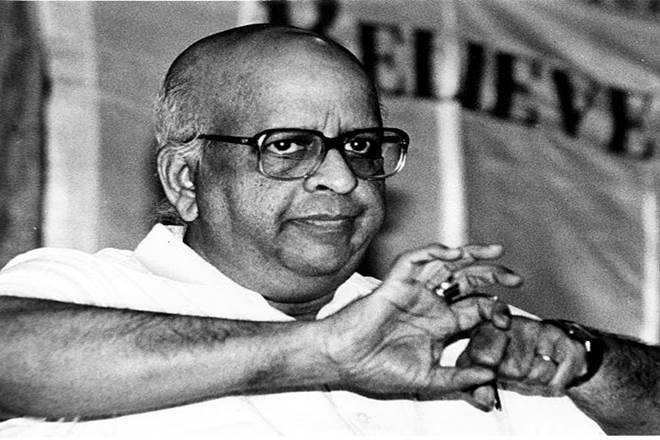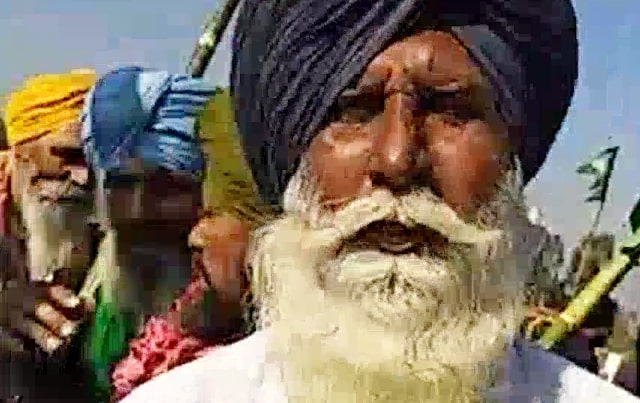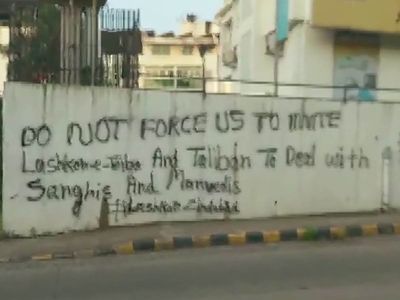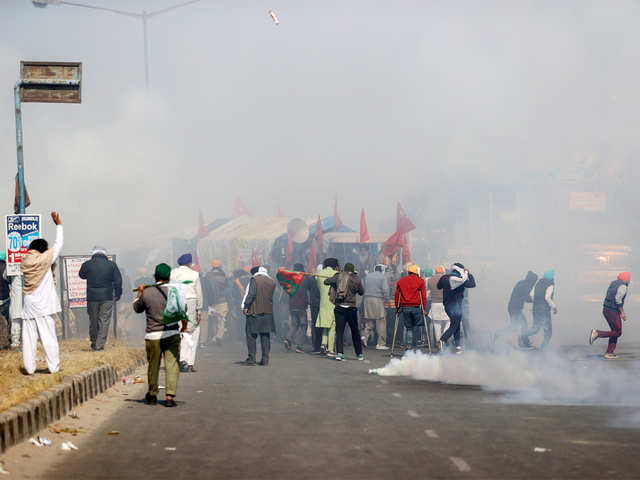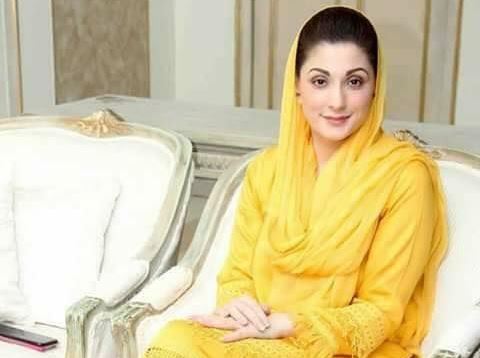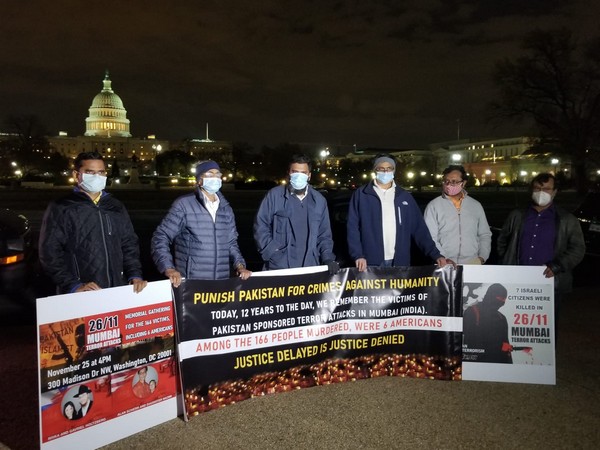As cabinet secretary to VP Singh, Seshan had to deal with
the kidnapping in Kashmir of the daughter of home minister Mufti Mohammed
Sayeed. Moosa Raza, an IAS officer of the Gujarat cadre, who was then the chief
secretary of Jammu and Kashmir, recalled that Seshan “used strong and
forceful language when dealing with his subordinates, but was meek and obedient
with his bosses”, and that Seshan meekly gave in to Vishvanath Pratap
Singh:
“In those days
before the advent of mobile phones, we communicated only through landlines,
which could be easily tapped at the telephone exchange.
It was suspected that many of those who worked at the
exchange were sympathisers of the militants.
(Then Cabinet secretary T N) Seshan insisted that I
speak with him only in Tamil, as it was unlikely that the exchange in Kashmir
would have any Tamil-speaking staff sympathetic to the militants. (Moosa Raza
was a Tamilian, a Navayat Muslim from Tamil Nadu).
Our efforts were
to keep the negotiations going through the intermediaries and, in the interim,
locate the safe house and get her released through commando action.
Both the state police chief and the intelligence
officials were opposed to the idea of using military force; they said it would
pose a grave risk to the life of the hostage.
The police and paramilitary forces stepped up their patrolling,
and photos of Rubaiya Sayeed were widely circulated.
Public opinion was mobilised to put pressure on the
militants and the JKLF.
Statements were issued by opinion makers and political
personalities, deploring the kidnapping of an innocent girl as an un-Islamic
and unethical act.
The CM (Dr Farooq Abdullah) was rather unhappy at
the pressure being brought on the state government by the Centre to release the
militants in exchange for the home minister’s daughter.
He was apprehensive that this would set a trend and lead
to more kidnappings in the future.
I was told that not only the home minister but also his
colleagues were troubled by the prolonged negotiations and wanted the matter to
be resolved as quickly as possible.
In the first couple of days after the kidnapping, there
was widespread condemnation of it in the press.
But as the days passed, there was a noticeable shift
towards the primary objective of getting the girl released.
There was sympathy for her plight, and the pressure to
release the militants and free her mounted.
I received a call from the Cabinet secretary at 1.30 am
on 13 December.
In a rather stiff and formal tone, he said, ‘This is the
Cabinet secretary to the GoI, T N Seshan, speaking to the chief secretary of
the state of Jammu and Kashmir, Mr Moosa Raza. I am speaking from the chamber
of the prime minister of India.’
‘The GoI desires the state government to note that it is
their undiluted responsibility to ensure the safe release of the hostage
without any injury to her, and we expect that all action you take will be
consistent with this requirement.’
Having made this pontifical statement from the throne as
it were, he abruptly disconnected.
The operative words were ‘at all cost’.
In other words, ‘release the militants’.
This also ruled out commando action, even if the police
and the IB were to locate her whereabouts.
‘Without injury to her’ could only imply that.
Some of my advisors believed there was an implicit threat
in the statement: If we could not get the girl released immediately, the state
government would be held squarely responsible for the failure and may even be
dismissed.
But it was still not clear to me whether the GoI had
agreed to an immediate release of the imprisoned militants and desired us to
accept the militants’s terms, or not.
After waiting for half an hour, I rang up the Cabinet
secretary in the hope that he would have returned from the PM’s office by then
and would clarify the sudden volte face.
I spoke to him in Tamil and asked to know the reason for
the change in stance when I had almost concluded the negotiations without any
loss of face to the government.
I also asked him about the implications of his message to
me from the PM’s chamber.
Seshan was aware that he was a lame duck Cabinet
secretary and his days in the Rashtrapati Bhavan annexe were numbered.
He could not stand up to a PM with an imperial streak in
him.
The Raja of Manda (Vishwanath Pratap Singh) had his way.
That last conversation with Seshan told me all I needed
to know about him: Here was a man given to using strong and forceful language
when dealing with his subordinates, but meek and obedient when it came to his
bosses.
The news was received by the CM and me with grave
concern, as it negated all the efforts at negotiations made until then.
I felt that since the girl could be brought back without
an exchange, it would be in the national interest to wait.
But my arguments did not find any favour in Delhi.
The CM was so perturbed by this unwarranted intervention
that he contemplated submitting his resignation immediately.
I informed the governor of the latest developments and
the CM’s state of mind.
Both (then governor) General (V K) Krishna Rao and I were hard put to dissuade him from such a
precipitate action in the midst of a crisis.
We were to release the five militants to the three
mediators, withdraw the police from certain localities and wait for three hours
for Rubaiya to be handed over to us.
This proposal, fraught with unpredictable complications,
was not acceptable to us.
I pointed out that once we had released the militants, we
had no guarantee that the JKLF would honour its side of the bargain,
particularly when there was a gap of three hours.
Anything could happen during those crucial hours.
Even if we trusted them to keep their side of the
bargain, we had no way of knowing whether some other militant group opposed to
the JKLF ideology (and there were many waiting on the sidelines for an
opportunity) would take advantage of the situation and hijack the girl while
she was on her way to Sonawar.
Dr Abdullah, who had all along been opposed to the
release of the militants, was even more upset at this turn of events.
It was under extreme pressure from the Centre that he had
even agreed to release the militants.
But having to wait for three hours before knowing whether
the government had been taken for a ride was not the kind of situation that
either he or I were prepared to face.
He was ready to tender his resignation there and then.
I think he spoke to the governor, who once again perhaps
restrained him from doing so.
At 2.30 am, I met the CM and apprised him of the Cabinet
secretary’s approval and my subsequent conversation with him.
He was dismayed.
‘They will destroy Kashmir,’ he said.
I could hear the agony in his voice.
But reluctantly, he told us to go ahead and finalise the
arrangements.
The next three hours were excruciating.
Even though I had obtained the necessary approvals, I was
aware that these were all verbal.
If anything went wrong, and for some reason the girl did
not turn up, my head would be on the chopping block.
There was every chance that everyone would wash their
hands of the responsibility, and I would be accused of having released the
militants off my own bat.
At 7.15 pm, a car pulled up at the house, and Rubaiya
appeared.
She seemed to be in good health, though shaken by her
ordeal.
Neither I nor the police ever got the opportunity of
debriefing her.
Rubaiya remained inaccessible to state and central
intelligence.
She could have given us valuable information, but I never
even learnt where she had been held captive.
Seshan called to congratulate me on the successful
conclusion of the episode.
He was effusive in his praise and asked me to convey the
government’s appreciation to my colleagues.
A couple of years later, I met Seshan, who was then chief
election commissioner, at the VIP lounge in Delhi airport.
As we walked towards the security clearance gate, I asked
him, ‘I have always wondered about the sudden change in your approach when you
dictated that ultimatum to me on the morning of 13 December.
What was the reason for that?’
‘The game was much bigger,’ he said, with a sardonic
smile.
‘The target was much higher.’
‘And what was that?’ I asked.
His reply is a story for another day.
The law and commerce minister in the Chandra Shekhar
government, Subramanian Swamy, appointed TN Seshan as the Chief Election
Commissioner in 1990. The two knew each other well from their Harvard days;
Seshan had been a Mason Fellow at Harvard, and he took several courses taught
by Swamy. Seshan, who prided himself on his culinary skills, would cook meals
for Swamy and his family. Prime Minister Chandra Shekhar had his misgivings,
but went along.
Now that he had the protection of a statutory position
and could not be harmed by politicians or civil servants any more, Seshan was a
man transformed. Thundering that he could be “removed only by an Act of
God”, Seshan went hammer and tongs after corrupt politicians, and cleaned
up the electoral system.
The same man who sucked up to dubious politicians like
his minister Bhajan Lal, now thundered: “I eat politicians for
breakfast”.
The same man who offered blandishments to journalists at
the tax-payers expense, and who hosted lavish alcohol-filled parties for
reporters, in order to influence their coverage of the Bofors scandal, now
dubbed all journalists as corrupt.
When prime minister PV Narasimha Rao subtly tried to
influence him, TN Seshan banged down the phone on the prime minister, shouting
at him: “I am the Chief Election Commissioner of the Indian nation, not of
the government of India or of the prime minister”.
He was dubbed Al Seshan, and Lalu Prasad coined the
phrase: “Seshan versus the Nation”. TN Seshan accused cabinet
ministers Sitaram Kesari and Kalpanath Rai of influencing voters, and told
prime minister PV Narasimha Rao to drop them from his cabinet.
There was a widespread backlash among politicians who
accused Seshan of exceeding his authority. There were numerous feuds between
Narasimha Rao and Seshan, and the prime minister and other politicians wanted
to rein in Al Seshan.
Several politicians wanted to move a resolution in
parliament to impeach Seshan. The wily but suave prime minister PV Narasimha
Rao realized the damage that an impeachment motion would do to the nation, so
he quietly quashed these impeachment efforts in parliament.
PV Narasimha Rao discovered that there was nothing in the
law which prevented him from appointing additional election commissioners. So
prime minister PV Narasimha Rao appointed MS Gill and GVG Krishnamurthy as
additional election commissioners too. A furious Seshan called MS Gill and GVG
Krishnamurthy donkeys, and blocked their entering the building of the Election
Commission.
Seshan posed for magazine covers flexing his biceps, and
approached the Supreme Court to have them removed from office. But a five judge
Constitution bench of the Supreme Court dealt a stinging defeat to Seshan,
ruling that MS Gill and GVG Krishnamurthy had powers and voting rights equal to
Seshan.
Surprisingly, the one politician whom Seshan did not
accuse of misdemeanor was J Jayalalithaa, even though she harshly criticized
him in public. In fact, her AIADMK cadres roughed up Seshan, and trashed his
room. When Seshan did not retaliate even after being roughed up by
Jayalalithaa’s followers, he was asked by a journalist: “Is this because
you are Tamil Nadu Seshan – your initials TN say so?” Seshan tried to have
this journalist arrested, but was put in his place by this journalist’s lawyers.
When reporters phoned him at his home, he would answer in
the grand manner of an English butler: “Mr Seshan is not available”.
When they pointed out that he himself was on the line, he would elaborate:
“I am not saying that Mr Seshan is not at home, which would be a lie. I am
saying that Mr Seshan is not available to give you any information”.
Hot on the heels of a story, the self-proclaimed
second-most important person in the country, Dileep Padgaonkar, phoned Seshan
late at night to get his version. Seshan banged the phone down on Padgaonkar.
The rest of the night, Seshan kept on phoning Padgaonkar, and cut off the line
as soon as Padgaonkar answered.
Seshan and his wife Jayalakshmi (they had no children)
lead a spartan, abstemious life. He spent most of his civil service salary on
donations to charitable causes, paying the school fees of hundreds of poor
children, and on buying books. He had a vast personal library of thousands of
books on a diverse range of subjects, especially on economics and political
science.
His wife Jayalakshmi was gracious and hospitable – her
father was a university vice chancellor, and she was a scholar and connoisseur
of classical music – and I wonder how much more obnoxious TN Seshan would have
been if not for her tempering influence.
He was highly intelligent, and amazingly well read on a
wide range of topics – and he made sure everyone knew how well read and
scholarly he was.
He was a stickler for punctuality and cleanliness. He
would throw people out of his office if they were even a minute late. He
frequently bragged – The toilets in my ministry are so clean that you can have
your lunch in them.
He was a know it all, giving his advice on every topic
under the sun to all and sundry. He would keep sermonizing to young women
reporters covering his ministries about why they should get married.
He was extremely status conscious, and always asked
everyone about their sub-caste, and their professional seniority, so that he
could either kowtow to them or snub them.
He was a publicity hound and always sought to be in the
headlines. He claimed that he was more popular than Amitabh Bachchan. He
thought he would give ‘quotable quotes’ to the media, but he ended up sounding
juvenile.
As soon as he became Chief Election Commissioner in 1990,
he thundered: “I don’t get a salary of 9000 rupees a month and a status of
a supreme court judge for nothing”, inviting sniggers since a salary of
9000 rupees was common in the middle rungs of the corporate sector.
While delivering a memorial lecture for my maternal
uncle, he made juvenile and puerile statements: “There are no statesmen
any more; only the Statesman newspaper. There are no titans any more, only the
Titan wrist watches”.
He bragged that he was a fantastic cook. He was a great
connoisseur and patron of Carnatic classical music, about which he was deeply
knowledgeable, as was his wife. He often said: “We Palakkad Iyers are
known for four C traits – great Carnatic musicians, top notch Civil servants,
excellent Cooks, and big Crooks”.
He was a deeply religious follower of the Kanchipuram
Shankaracharya. When the Shankaracharya passed away, Seshan demanded Dhirubhai
Ambani’s personal aircraft so that he could immediately fly to Kanchipuram. A
huge furore broke out. Seshan called a press conference, and wrote out a cheque
in favour of Dhirubhai Ambani.
There were also whispers about TN Seshan having received
valuable gifts from Sathya Sai Baba, of whom he was a devotee.
Seshan prided himself on his astrological and palmistry
skills, but his own predictions for himself did not come true at all.
He announced widely that his horoscope forecast that he
would either become the president of India or the Secretary General of the
United Nations.
In fact, Seshan had even threatened prime minister PV
Narasimha Rao – “My next job is going to be either president of the nation or
secretary general of the United Nations, and so you had better not try to harm
me”.
But Seshan received a massive drubbing when he ran for
president against KR Narayanan in 1997, getting the votes of only a few
legislators from the Shiv Sena.
Seshan invited ridicule when he accused KR Narayanan of
fraud, asserting: “In some places he has mentioned his name as KR
Narayanan whereas at other times he has mentioned his name as Narayanan
KR”.
TN Seshan spread a rumour that he would be appointed a
governor. When the press questioned him, he replied: “My wife would not
appreciate being called a governess”.
He made pathetic attempts to enter politics, abjectly
begging for support from the very politicians whom he had vilified when he was
election commissioner. Every political leader snubbed him. He was soundly
defeated when he stood for parliament against Lal Krishna Advani.
After all his attempts to enter politics failed
miserably, Seshan and his wife Jayalakshmi retired to an old age home in
Chennai. They had no children, and few friends.
He donated most of his civil service pension to numerous
charitable causes, paying for the food and education of hundreds of poor
children. In fact, when Jayalakshmi and Seshan were getting married, the
astrologers predicted that they would have no children. Seshan had then taken a
sacred vow that he and his wife would bring up all needy children as their own.
The nation owes TN Seshan a debt of gratitude for
cleaning up the corrupt electoral system. He also did some good work when he
was secretary in the ministry of environment and forests.
But the fawning accolades in the media do not mention how
he destroyed the careers of many diligent civil servants in order to please his
political masters, nor his role in trying to cover up the Bofors scandal.
Shri Surendra Singh, an IAS officer of the 1959 batch,
who became Cabinet Secretary five years after TN Seshan, recollected:
”
TN Seshan ruined or tried to ruin the career of a number of outstanding
officers who did not give in to his unreasonable demands.
One of my
brushes with him happened when he was Secretary – Environment and Forests, and
I was Principal Secretary, Industries, in the state of Uttar Pradesh.
The Environment
and Forests ministry had issued an illegal order relating to the Doon Valley.
When they did not agree to retract it, the Uttar Pradesh state government filed
a petition in the Supreme Court.
TN Seshan sent
for me and threatened to ruin my career if the petition was not withdrawn.
We stuck
to our guns and won our case in the Supreme Court.
Luckily for me,
TN Seshan was not in a position to do me harm. I am aware of several such
instances. “
TN Seshan was very honest in money matters ( in fact he
donated most of his salary and pension to bringing up hundreds of poor children
), but he was not a man of conviction. During his long career in the IAS, he
stretched rules, procedures and conventions to their limit in order to please
his political masters – but without actually breaking the letter of a single
rule.
A very senior contemporary of his in the civil services
summed him up accurately: “TN Seshan kissed a lot of arses, but he
buggered a lot of arseholes too”.


